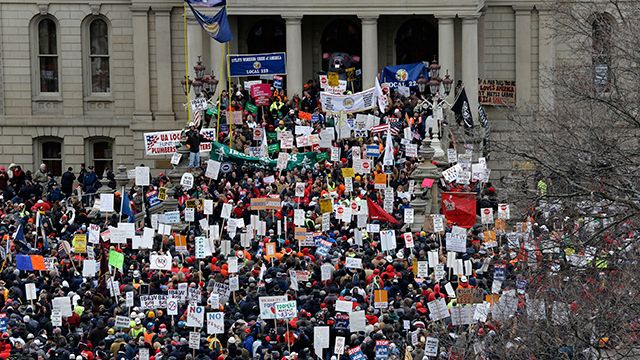
As police held back thousands of protesters near the state capital building, Michigan, the birthplace of the modern labor movement, became the 24th state to enact so-called “right-to-work” legislation. Earlier today, Governor Rick Snyder signed two bills preventing public and private sector unions from requiring workers to pay union fees.
The Detroit News reports that after requests from Grover Norquist and others, Snyder switched sides on the issue. United Auto Workers President Robert King said in an interview, that the Koch brothers and Amway owner Dick DeVos “bullied and bought their way to get this legislation in Michigan.”
In an editorial headlined “Drinking the Kochs’ Kool Aid,” the Detroit Free Press was unable to account for the governor’s change of heart, but offered some theories on the motivations of State Senate Majority Leader Randy Richardville. He may have been under pressure, the newspaper said, from the anti-union Americans for Prosperity and the American Legislative Exchange Council (ALEC), both financially supported by the Koch brothers. ALEC’s model right-to-work bill “mirrors the Michigan law word for word.”
Word is the groups threatened Senate Majority Leader Randy Richardville’s leadership post, and promised him a primary challenge in 2014, if he refused to move right-to-work forward.
But none of this explains why the seemingly pragmatic Snyder would hitch his wagon to an organization that has already demonstrated more interest in its own ideological objectives than in Snyder’s priorities. What have the [American Legislative Exchange Council] ALEC’s sponsors done for Michigan, and how did a governor who seemed dedicated to the middle path …end up in bed with them?
(Although it isn’t known how many Michigan state legislators are members of ALEC, the Detroit Free Press reports that at least one of the lawmakers who introduced the bill has been associated with ALEC.)
Some have speculated that the governor’s decision was born out of frustration with the UAW, which earlier this year pushed through a ballot initiative to write collective bargaining rights into the state constitution. The proposition was voted down in November by a margin of 58 to 42 percent. Greg McNeilly, who runs Michigan Freedom Fund, a PAC that supports the right-to-work law, told The Washington Post that the measure’s failure emboldened Republicans.
“Bob King put this on the agenda,” McNeilly said, referencing the UAW president. “He threatened this state. He tried to bully and intimidate the state with this disastrous proposal that was so bad a majority of his members didn’t even back it. The whole state had a conversation. They lost.”
Last week, the governor and the state’s House and Senate majority leaders suddenly moved on the legislation, announcing their plans in a group press conference in which they said the issue is about fairness: workers should have a choice.
In fact, workers already do have a choice. Federal law guarantees that they can’t be forced to join unions, that they can’t be made to pay dues or fees to causes they don’t support. A worker hired today in a Michigan union shop already can refuse membership and pay only a fraction of a union member’s dues to cover the cost of workplace bargaining. The new law — aimed at weakening unions even further — effectively puts organized labor into a position where workers can pay nothing and still receive the benefit of collective bargaining.
As President Obama noted on Monday, “These so-called ‘right-to-work’ laws, they don’t have to do with economics, they have everything to do with politics. What they’re really talking about is giving you the right to work for less money.” Research backs the president up. Last year, the Economic Policy Institute released a report estimating that right-to-work laws decreased hourly wages for all workers by 3 percent. When businesses make a profit, the beneficiaries are typically CEOs and owners, not workers.

